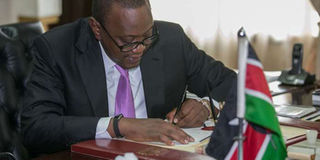New law will help sort out the mess in our political parties

President Uhuru Kenyatta. . PHOTO | PSCU
What you need to know:
- They argue that they cannot expect free and fair party primaries ahead of the 2017 General Election and, therefore, want the right to switch tickets at will.
- Our experiment with multi-party democracy has, indeed, been characterised by anarchy, absence of common decency and decorum, and utter chaos in party organisation.
It was a welcome concurrence of minds when President Uhuru Kenyatta and opposition leader Raila Odinga separately whipped their respective party legislators into line on the proposal designed to end the culture of party-hopping.
The proposal that would block aspirants who lose out at their party nominations from shifting to alternative tickets was passed by the National Assembly as part of the raft of changes negotiated to reform the electoral laws.
However, a number of politicians are now threatening to challenge the new rules in court.
They argue that they cannot expect free and fair party primaries ahead of the 2017 General Election and, therefore, want the right to switch tickets at will.
They are offering the dubious argument that the law barring party-hopping is unconstitutional as it denies them freedom of association and the right to belong to parties of their choice.
One does not need legal training to see through such hackneyed arguments.
Civilised democratic society is governed by rules and the electoral process must have some basic guidelines, otherwise tyranny thrives.
Our experiment with multi-party democracy has, indeed, been characterised by anarchy, absence of common decency and decorum, and utter chaos in party organisation.
It is to deal with some of these systemic failures that the rule against party-hopping was introduced.
It will, hopefully, force political aspirants to join the parties they believe in and remain faithful to them even if they lose at the nominations.
It will also force parties to manage themselves well so that they can attract and retain the best candidates.
They must learn to run their internal polls efficiently and transparently, devoid of the chaos, mismanagement, fraud, and rigging with which they are all associated.
Our democratic evolution must also see the emergence of national political outfits based on clear ideologies, principles, and programmes rather than the ethnic and personal special purpose political vehicles that presently litter the landscape.
GOOD EFFORT
We have seen, since the demise of the Kanu kleptocracy, all kinds of parties and alliances that are barely able to survive one electoral cycle.
The introduction of some sanity in our democratic process will start when we have predictable and functional party politics.
Since politicians cannot tame themselves, they must be tamed by the law.
Confronting the culture of “Plan B” parties reposing in the back pocket or handbag is a good step.
It will also help to deal with the proliferation of mercantile outfits always ready to sell nominations.
The present parties and alliances must now seek to grow from their narrow personal and ethnic roots to outfits that transcend sectional and regional boundaries.
The governing Jubilee alliance’s move to merge President Kenyatta’s and Deputy President William Ruto’s personal political vehicles, TNA and URP, respectively, is a good start.
It is an evolution that the opposition Cord alliance of Mr Odinga’s ODM, Mr Kalonzo Musyoka’s Wiper Party, and Mr Moses Wetang’ula’s Ford-Kenya should emulate if they want to present the face of a government-in-waiting rather than a disorganised rabble.
President Kenyatta should move with haste to assent to the amended laws so that the electoral management body can be reconstituted without further delay.
We must also start asking hard questions of the Registrar of Political Parties, who deserves a big kick up the backside for not taking action on all those outfits that refuse to meet the basic requirements.
*****
It has been more than a fortnight since former President Mwai Kibaki was flown out to South Africa for emergency medical care.
During that period, the public has been regularly assured that Mr Kibaki was responding well to treatment, was fine and lucid, and due home any time.
These assurances were necessary to calm an anxious public. However, they are not enough.
Rumour and speculation will not be stilled by mere assurances, especially as the sojourn lasts longer than expected.
The Kibaki family has, understandably, invoked the need for privacy, but that imperative should not ignore the fact that the former president is a public personality with a constituency bigger than his immediate kin.
The absence of independent corroboration of Mr Kibaki’s condition is a major failure of communication that serves only to fuel more worry and speculation.
A simple media opportunity would go a long way towards assuring the public that all is well.
[email protected]. Twitter: @MachariaGaitho





